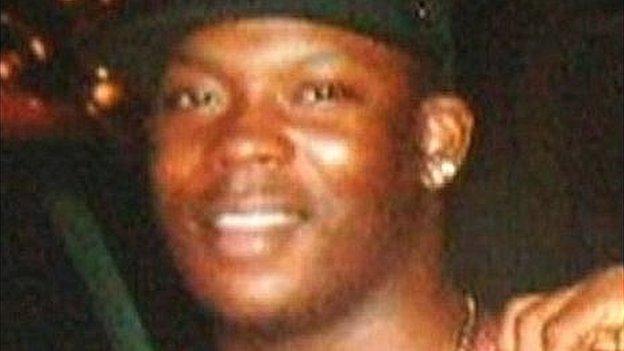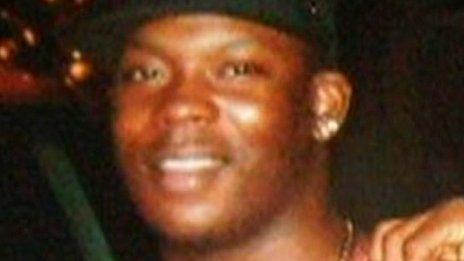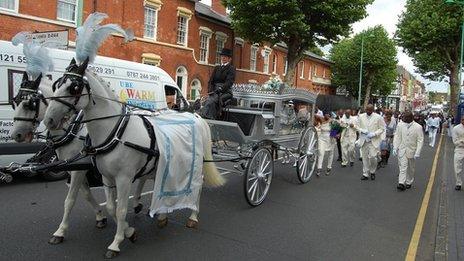Kingsley Burrell inquest: Restraint 'contributed' to death
- Published
Kingsley Burrell
Prolonged restraint and a failure to provide basic medical attention contributed to the death of a student who was detained under mental health laws, an inquest jury has ruled.
Kingsley Burrell was detained in March 2011 after West Midlands Police attended a disturbance in Birmingham.
Mr Burrell, 29, was taken to a unit in the city and then moved to hospital where he died from a cardiac arrest.
Four police officers face a misconduct hearing at the end of June.
The six-week inquest also found a covering placed over Mr Burrell's face should have been removed by ambulance workers, hospital staff and police.
Speaking outside the court, Mr Burrell's sister Kadisha Brown-Burrell said if there had been an unlawful killing verdict the family would "see that as having justice".
"But having a narrative verdict is like telling a story but not naming any individual in order to prosecute those individuals", she said.

Mr Burrell's family and their supporters marched through Birmingham seven months after his death to demand an inquiry into what happened
'Nothing has been learned'
Assistant Chief Constable Garry Forsyth said: "We do not underestimate the impact Kingsley Burrell's death and the subsequent investigation has had on both his family and the wider community.
"Crucial lessons have been learned from this tragic case and how the force manages people who are detained with mental and physical health needs.
"In 2013 West Midlands Police launched its street triage scheme. This has seen the force team up with regional NHS Trusts to launch specialist units that crews officers with psychiatric nurses and paramedics to answer calls involving people thought to be experiencing mental ill health."
Ms Brown-Burrell said she was "sick of hearing about lessons learned" because in the past "nothing has been learned".

What is restraint?
Restraint is used when agents of the state - including police officers, medical staff, hired security workers and even teachers - need to deal with potentially violent situations.
The aim is for staff to bring the person - or people - under control quickly.
For example, a prison officer might consider using restraint if a confrontation between prisoners was escalating.
What training is required?
Professionals who use restraint are required to undergo training. They have to be able to assess a volatile situation quickly, choose the right method to deal with it and be able to move from one technique to another in a fluid situation.
The Home Office says custody officers who escort detainees have to have passed a course, external on escorting safely.
Read more: Q&A: How is restraint used in the UK?

The West Midlands Police and Crime Commissioner David Jamieson said he would ask for a detailed report and "would scrutinise the case in detail and hold the police to account".
He said: "Lessons need to be learned by the agencies involved so that these tragic incidents are not repeated.
"One death is one too many, whatever the circumstances."

Kadisha Brown-Burrell said she had been 'concerned' about her brother's treatment
Mr Burrell's sister Kadisha Brown-Burrell told Birmingham Coroners Court she had visited the mental health unit at the Queen Elizabeth Hospital and had been concerned by his condition.
"He couldn't move his head, couldn't move his body, couldn't move his shoulders.
"[He] had three lumps, one on his forehead."
She told the inquest when she visited the following day her brother had urinated and had been left on the floor in handcuffs for five or six hours.
"He said that while he was in the QE during assessment he was on the floor, and all he wanted was a glass of water," she said.
The jury concluded its findings by saying there had been a "gross failure to provide or procure" basic medical attention in response to an obvious need. Members of Mr Burrell's family reacted with applause.
Campaigners have called for a public inquiry and that those responsible are held to account.
Ms Brown-Burrell said the family would be approaching the Crown Prosecution Service to review last year's decision not to bring criminal prosecutions against anyone involved.
"There is obviously a culprit out there", she said.
The Birmingham Coroner, Louise Hunt, promised she would write to the Home Office, the College of Policing, the Association of Ambulance Service Chief Executives, and the secretary of state for health to ensure lessons are learned nationally.
- Published7 April 2015

- Published16 December 2014
- Published1 July 2014

- Published4 July 2014

- Published31 August 2012

- Published3 April 2011